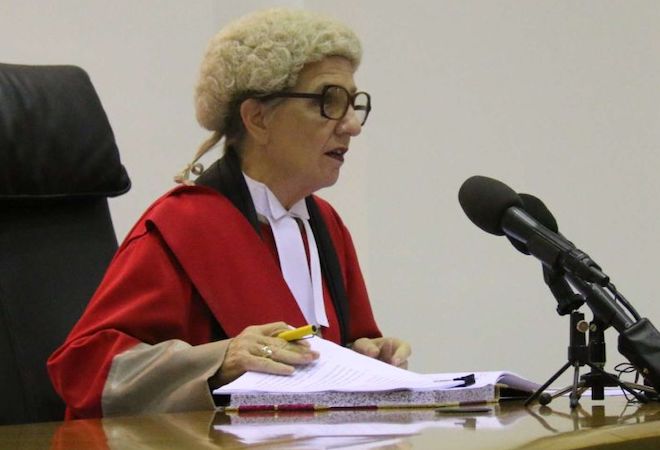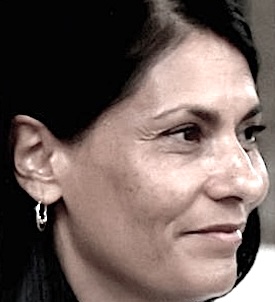Justice Judith Kelly
 On the Couch •
On the Couch •  Thursday, September 3, 2020
Thursday, September 3, 2020 President of the Judicial Conference of Australia speaks about the burning issues for the judiciary ... Attacks on judges ... Judicial selection ... The work of the JCA ... Her frustrations as a judge ... The benefits of a bar fridge on the back verandah ... Curried eggs on toast ... Justice Judith Kelly from the Northern Territory Supreme Court is on Justinian's Couch
Justice Kelly: Friday afternoon drinks are niceJudith Kelly is a judge of the Supreme Court of the Northern Territory and president of the judges "union", the Judicial Conference of Australia.
Before studing law at the University of Queensland, Judith Kelly was a teacher in Batchelor, NT. After graduating in law with honours she worked at Morris Fletcher & Cross, later to become Clayton Utz.
She joined William Forster Chambers in Darwin in 1996 and was appointed senior counsel in 2008 and a judge the following year.
Judith Kelly has served on the council of the Law Society of the NT, was vice-president of the NT Bar Association, and a member of the governing council of the Judicial Conference since 2010. She as a member of the NT Law Reform Committee between 1991 and 1993.
And here she is on Justinian's couch, putting aside concerns about her "terrible haircut".
Describe yourself in three words.
Organism, human, mother.
(The next two categories in the taxonomy are "Australian" and "lawyer" - sometimes in that order and sometimes the other way round depending on context.)
What are you currently reading?
I am presently rereading Bill Bryson's "A Short History of Nearly Everything", have just finished "Just Mercy" by Bryan Stevenson, am about to start "Invisible Women: Exposing Data Bias in a World Designed for Men" lent to me by my associate, and I nearly always have a Terry Pratchet book on the go.
What's your favourite film?
Casablanca - by far the best film ever made.
Who has been the most influential person in your life?
Probably my grandmother. She was wise, generous and loving and had a truly wicked sense of humour.
When were you happiest?
When our son was born.
What is your favourite piece of music?
I don't have a favourite. I like jazz, also singing in harmony, intricate guitar playing, Gilbert and Sullivan ...
What is in your refrigerator?
You'd have to ask my husband as he does most of the cooking. Like most Territorians, we have a second fridge on the back verandah for the beer and wine. I'm more familiar with the contents of that.
(This has the added side benefit that any burglar who is just looking for grog doesn't have to go inside - which can be upsetting for everyone.)
Who would you most like to be with on a desert island?
My husband - but I was really impressed by the clear thinking woman who answered "a boat builder".
Why did you want to be a lawyer - and why in the Northern Territory?
I was a pretty shallow young person - I just thought it would be cool, but I soon learned to love the law. I took time out from studying law to be a teacher here in the Northern Territory for about six years and fell in love with the place. I would not want to live anywhere else or do anything else.
What is the most rewarding aspect of your work?
Hard to say. I love the intellectual stimulation of judgment writing - especially on appeals. I enjoy mentoring and getting to know young associates - and watching their progress when they leave to become lawyers. Working with juries is good. We also have a really great collegiate atmosphere in our court which is wonderful. Friday afternoon drinks are nice.
And what is the most frustrating?
The steady stream of serious domestic violence and homicides by offenders who have done the same thing over and over - usually when drunk - often many times against the same victim - and knowing that nothing the court can do will change things.
What does the Judicial Conference of Australia do?
The JCA is sometimes referred to as the judges' union - which irritates some people. Of course it is not accurate - the principle of the independence of the judiciary means that judges and magistrates are not employees for one thing - but, personally, I quite like the label, if only for its protective connotations.
The JCA is actually the professional association of judges and magistrates in Australia. Its objects include the maintenance of a strong and independent judiciary as the third arm of government in Australia; promoting a better public understanding of the benefits of the rule of law and of the role of the judiciary in the administration of justice; and improving the quality of the judicial system, as an instrument of the rule of law. We also promote research on areas of interest to the judiciary.
One of the JCA's very important functions - and the one that is the most visible - is defending the judiciary and judicial officers against unwarranted attacks. That is important because individual judicial officers are precluded from publicly defending themselves and attorneys-general no longer take it as part of their role to do so.
Each year (except this year for obvious reasons) the JCA holds a conference - which we call a colloquium, presumably because the association is called a conference. One of the major strengths of the JCA is that its membership is drawn from all Australian courts and, as well as the usual academic papers, the annual colloquium provides an opportunity for judicial officers to meet colleagues from different courts and different jurisdictions, to share views on issues common to all courts and hear about initiatives in other jurisdictions.
 Justice Kelly: a steady stream of serious domestic violence and homicide offences
Justice Kelly: a steady stream of serious domestic violence and homicide offences
What are the main issues of concern for the judiciary?
I think that resourcing of courts is a pretty big issue. There are not enough judges and associated staff to do the work. This leads to overworked judges and magistrates, and undue delays for litigants.
Another concern, I think, is the disturbing and growing trend of attacks in the media on the judiciary in general and on individual judicial officers, recent examples being attacks on individual members of the Court of Appeal in Victoria over the Pell decision and individual members of the High Court over the Love decision.
Criticism of court decisions and the reasoning behind those decisions is legitimate and welcome. However, personal sledging of judges, and attacks on the judiciary in general can only have the effect of undermining public confidence in the courts and is to be deplored, especially when (as has sometimes been the case) the attacks come from senior members of the executive arm of government.
Recent calls for political considerations to be taken into account in the appointment of High Court judges and to move more in the direction of the American system would also be a real concern if they were to be taken seriously.
Should attorneys general step up more assertively to defend the work of judges – why don't they?
I think it now has to be accepted that the judiciary must defend and speak for itself. Although individual judges cannot speak publicly in response to unfair criticism of themselves or their decisions, the JCA as a body can and does do so.
The JCA was formed in 1993 at a time when concerns were being raised at the failure of some attorneys-general to accept any responsibility for the defence of the judiciary, and partly in response to that trend.
Daryl Williams QC, who was the Commonwealth attorney-general from 1996 to 2003 stated explicitly that he did not consider it as part of the role of the AG to defend the judiciary. He pointed out that attorneys-general were likely to accord a low priority to monitoring the media on behalf of the judiciary; that they would need to be briefed and therefore unable to provide a timely response; and that there was also a real risk of a conflict between the interests of the judiciary in a substantive reply on a particular issue and the political interests of the government of which the attorney-general was a member.
Is the tension between the judiciary and tabloid publishers too much to bear?
Not at all. They have their job to do and we have ours. One could wish for a more balanced, more nuanced approach to reporting on court related matters - but periodically exploding into furious outrage at tabloid publishers can be fun in its own way.
What do you think is the community perception of judges?
Despite the efforts of some shock jocks to paint judges and magistrates as out of touch and soft on crime, I think that the judiciary is generally held in high regard by the community.
When there is a significant matter of community concern, governments almost always go to judges or former judges to form commissions of inquiry or royal commissions because they know that the community is likely to accept what the judge produces as objective, fair, considered and to be relied upon.
In what ways would you like to see changes to the way judges are selected?
Speaking personally, I agree with the view expressed by former Chief Justice French that we should be wary of any reform which bureaucratises the appointment process.
Under the present system, where appointments are made by the executive following a process of consultation, those responsible for the appointments are answerable to the parliament and, ultimately to the electorate for their decisions.
In the UK, in the name of transparency, they have essentially shifted the responsibility for appointments to public servants which I think is a wholly retrograde step.
As for recent calls for potential appointees to the High Court to be "screened" to ensure the appointment of "legal conservatives," this is simply a call to politicise appointments. It would lead to the situation which obtains in the United States where appointments to the Supreme Court have become blatantly politically partisan. Any such attempt would be damaging to the integrity of the court.
What activities consume most of your waking hours?
Work.
If you were on death row, what would you request for your last meal?
It would have to be comfort food - curried eggs on toast, done my way.
If you were a foodstuff, what would you be?
Champagne!
Who do you most admire professionally?
Noel Pearson.
He is always so rational, so reasonable and so sensible and yet he manages to combine that with a passion for the advancement of Aboriginal people in this country which is awe-inspiring.
What is your favourite word?
I don't have a favourite word. Ontological is nice.
What would you change about Australia?
Like most people, I would like to see an end to indigenous disadvantage. Like most people, I am pretty clueless about how that is to be accomplished.
I would also like to see an end to the kind of polarisation that has people isolated in bubbles of the like-minded not listening to each other - but this is not happening just in Australia.
What would your epitaph say?
When I was a teenager and not studying hard enough for my mother's liking, she said she would write on my tombstone, "She had potential". But I don't want a tombstone; burned in a cardboard box and a fine wake to follow would be my preference.
What comes into your mind when you shut your eyes and think of the word "justice"?
The image of Gough Whitlam pouring the dirt into the hand of Vincent Lingiari.










Reader Comments